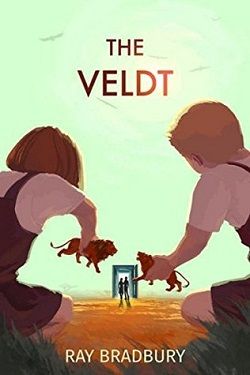Summary

The Veldt
by Ray Bradbury
The advanced technology of a house first pleases then increasingly terrifies its occupants.
.
Read
The Veldt on http://kissnovel.net
Martial Peak Reviews
Ray Bradbury's short story "The Veldt," originally published in 1950 as part of his collection The Illustrated Man, is a haunting exploration of technology's impact on family dynamics and the human psyche. Set in a futuristic home equipped with advanced technology, the narrative follows the Hadley family, particularly focusing on the children, Peter and Wendy, and their increasingly unsettling relationship with their automated house. The story serves as a cautionary tale about the dangers of over-reliance on technology and the potential consequences of neglecting emotional connections.
At the heart of "The Veldt" is the theme of alienation. The Hadley family lives in a house that caters to their every need, from cooking meals to providing entertainment. However, this convenience comes at a cost. The parents, George and Lydia Hadley, find themselves increasingly disconnected from their children, who prefer the company of their virtual reality nursery over real-life interactions. The nursery, which can create any environment the children desire, becomes a symbol of their detachment from reality. The children’s obsession with the African veldt setting, complete with lions and a savannah landscape, hints at their suppressed emotions and desires, ultimately leading to a chilling climax.
Bradbury’s portrayal of the Hadley family is particularly striking. George and Lydia are depicted as well-meaning but ultimately ineffective parents. Their attempts to engage with their children are met with resistance, and their reliance on technology to raise their kids leads to a profound sense of helplessness. The character development of Peter and Wendy is equally compelling; they transition from innocent children to figures of menace, embodying the consequences of a childhood devoid of parental guidance and emotional support. Their chilling manipulation of the nursery reflects a deeper psychological struggle, showcasing how technology can warp young minds when left unchecked.
The story's setting plays a crucial role in amplifying its themes. The Hadleys' home is a character in itself, representing the pinnacle of technological advancement. It is designed to fulfill every whim, yet it becomes a prison for the family. The nursery, with its ability to create lifelike simulations, serves as a stark contrast to the emotional barrenness of the home. As the story progresses, the veldt becomes increasingly sinister, mirroring the children’s growing detachment from their parents and reality. The vivid imagery Bradbury employs immerses readers in this unsettling world, making the eventual horror all the more impactful.
Another significant theme in "The Veldt" is the loss of control. George and Lydia Hadley initially embrace the technology that surrounds them, believing it enhances their lives. However, as the story unfolds, it becomes clear that they have relinquished control over their household and, more importantly, their children. The nursery's ability to read the children's thoughts and desires illustrates the extent to which technology has infiltrated their lives. This loss of control culminates in a terrifying realization: the very technology designed to serve them has become a tool of their destruction. Bradbury masterfully illustrates this theme, prompting readers to reflect on their own relationships with technology and its potential to dominate rather than assist.
The story's climax is both shocking and thought-provoking. The transformation of the nursery from a place of wonder to one of horror serves as a powerful metaphor for the consequences of neglecting emotional bonds. The lions, once a benign aspect of the veldt, become agents of violence, symbolizing the children’s repressed anger and resentment towards their parents. This shift underscores the idea that unchecked technology can amplify negative emotions, leading to catastrophic outcomes. Bradbury leaves readers with a lingering sense of dread, forcing them to confront the implications of a future where technology replaces human connection.
In comparison to other works of speculative fiction, "The Veldt" resonates with themes found in stories like Isaac Asimov's "The Machine Stops" and Arthur C. Clarke's "The Nine Billion Names of God." Both Asimov and Clarke explore the relationship between humanity and technology, often highlighting the dangers of over-dependence. However, Bradbury's approach is uniquely intimate, focusing on the familial aspect and the psychological ramifications of technology on personal relationships. His ability to weave a narrative that is both personal and universal is what sets "The Veldt" apart from its contemporaries.
The impact of "The Veldt" extends beyond its narrative; it serves as a prescient warning about the trajectory of modern society. As we become increasingly reliant on technology for convenience and entertainment, Bradbury's story prompts us to consider the potential consequences of this dependence. The emotional disconnect experienced by the Hadley family is a reflection of contemporary issues, where screens often replace face-to-face interactions. In an age where virtual reality and artificial intelligence are becoming more prevalent, "The Veldt" remains eerily relevant, urging readers to reflect on their own relationships and the role technology plays in their lives.
In conclusion, Ray Bradbury's "The Veldt" is a masterful exploration of the intersection between technology and human relationships. Through its compelling characters, vivid imagery, and thought-provoking themes, the story serves as a cautionary tale about the dangers of alienation and the loss of control in an increasingly automated world. As readers navigate the complexities of modern life, Bradbury's work remains a vital reminder of the importance of maintaining genuine connections in an age dominated by technology.







![The Heroine Of Drayfox [Official]](/upload/pic/manga/the-heroine-of-drayfox--official-.jpg)
















Reviews 0
Post a Reviews: